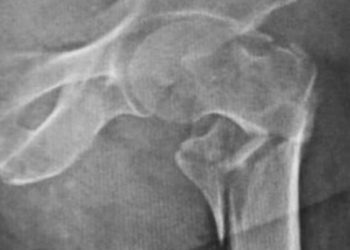Preterm birth linked to higher incidence of severe neurodevelopmental disabilities at age 5
1. Rates of severe and moderate neurodevelopmental disabilities increased as gestational age group decreased.
2. Approximately half of children born between 24-26 weeks’ gestation needed at least one developmental intervention, versus a quarter of children born at 32-34 weeks.
Evidence Rating Level: 2 (Good)
Study Rundown: Approximately 10% of babies in North America are born more than three weeks before their estimated due date. Previous studies have provided evidence that these children may be at higher risk of developmental difficulties, but these often cannot be identified until the child is older than age 2. For the purpose of better understanding the impact of preterm births, this population-based cohort study recruited children born at 22-34 weeks’ gestation and evaluated them at five and a half years of age. Children were evaluated on motor, sensory, cognitive, and behavioural domains by clinical examination and parent interviews. Rates of severe/moderate neurodevelopmental disabilities were higher as gestational age group decreased. Secondary outcomes, such a need for school assistance and developmental interventions, were also increased in those born more severely premature. Neurodevelopmental disabilities were also increased in families with low socioeconomic status. Parental concerns were increased as gestational age decreased, with behavioural concerns being the most common concern in all gestational age groups. Limitations of this study include the large amount (>30%) of recruited participants lost to follow-up, which represented a population with lower socioeconomic status and more single mothers. Nonetheless, this large-scale prospective study provides quality evidence that pre-term babies are at a higher risk of neurodevelopmental disabilities, which may call for more prevention measures earlier in the child’s life, such as parent education and directing health resources. Further studies are needed to fully understand the developmental mechanisms that can be targeted to better the outcomes for these children.
Click to read the study in the BMJ
Relevant Reading: Cognitive, motor, behavioural and academic performances of children born preterm: a meta-analysis and systematic review involving 64 061 children.
In-Depth [prospective cohort]: This prospective cohort study utilized data from EPIPAGE-2 – a study including all births between 22-34 weeks’ gestation in all maternity units in France since March 2011. At 5 and a half years of age, all participants underwent clinical examination by a pediatrician and psychologist. Parents were interviewed at this time and filled out questionnaires. The reference group used was 592 children who were born at-term, who are part of the ELFE cohort study. The primary outcomes assessed were motor disability (coordination, cerebral palsy), sensory disability (visual, hearing), cognitive disability, and behavioural difficulties. Secondary outcomes included education difficulties, complex interventions needed, and concerns parents had overall. A significant portion of the participants (1358) were lost to follow-up, leaving 3083 surviving who were evaluated, which included the 365 who could only be evaluated by telephone questionnaire. The study reported results for gestational age groups of 24-26, 27-31, and 32-34 weeks. Rates of severe/moderate disabilities were 28%, 19%, and 12% for children born at 24-26 weeks’, 27-31 weeks’, and 32-34 weeks’ gestation, respectively. Utilization of school assistance decreased from 27% to 14% to 7%, respectively. Children who required at least one developmental intervention (ex. Speech therapist, orthoptist, psychiatrist) also decreased from 51.9% to 33.3% to 25.6% as gestational age group increased. In addition to gestational age at delivery, male sex, children born small for gestational age, and lower socioeconomic status were all associated with increased rates of neurodevelopmental disabilities.
Image: PD
©2021 2 Minute Medicine, Inc. All rights reserved. No works may be reproduced without expressed written consent from 2 Minute Medicine, Inc. Inquire about licensing here. No article should be construed as medical advice and is not intended as such by the authors or by 2 Minute Medicine, Inc.








